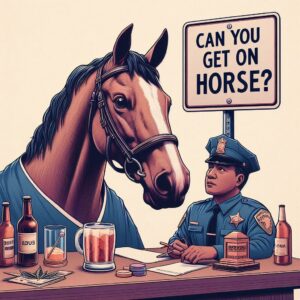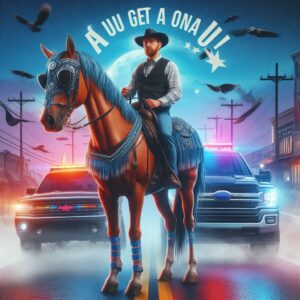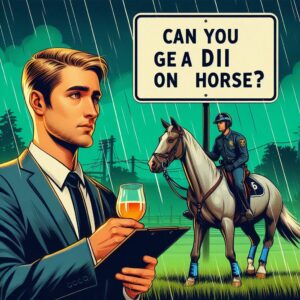The query “Can you get a DUI on a horse?” may sound just like the setup for a punchline, however it’s a serious legal subject matter that sparks curiosity amongst equestrians, prison lovers, and informal readers alike. With the worldwide rise in DUI (Driving Under the Influence) enforcement, knowledge how those legal guidelines follow to unconventional modes of transportation like horseback using is greater relevant than ever. This article dives deep into the criminal landscape, protection concerns, and practical techniques for staying compliant and secure, imparting over 2,000 phrases of original, SEO-optimized content material tailored for novices and seasoned riders. Whether you’re a weekend trail rider or a rural resident counting on horses, this manual presents actionable insights to navigate this quirky but essential problem.
Why This Question Matters
DUI laws are designed to protect public safety with the aid of preventing impaired people from operating cars that could endanger others. But what happens whilst the “vehicle” is a residing animal? Horses, as soon as a primary mode of shipping, nonetheless function practical transportation in rural regions, Amish groups, and recreational settings. As alcohol consumption remains a social norm, the intersection of using and ingesting raises questions on legality, obligation, and safety.
This article explores whether or not driving a horse even as intoxicated can cause a DUI rate, how laws vary by place, and what riders can do to avoid legal trouble. We’ll wreck it down into clean sections, every addressing a key aspect, with professional costs, a comparative desk, and a FAQ to make sure readability for all readers.
Section 1: Understanding DUI Laws and Horses
What Is a DUI?
A DUI price usually applies whilst someone operates a automobile while impaired via alcohol or pills, with a blood alcohol concentration (BAC) at or above the prison restriction (usually zero.08% in the U.S.). The term “car” is valuable to the controversy, as maximum legal guidelines consciousness on motorized delivery like vehicles, vehicles, or motorcycles. However, a few jurisdictions define “car” widely, sparking debate approximately whether or not animals like horses qualify.

Do Horses Count as Vehicles?
The criminal popularity of a horse below DUI laws relies upon on local statutes. In many U.S. States, a car is described as any tool used to move human beings or goods on public roads, that may consist of bicycles, golf carts, or maybe horse-drawn carriages. Horses themselves, however, are trickier. Some states explicitly exclude animals from DUI statutes, while others leave room for interpretation.
For example:
- California: Vehicle Code Section 21050 subjects anyone riding an animal on public roads to the same rules as motor vehicles, meaning a DUI charge is possible.
- Minnesota: DUI laws apply only to motor vehicles, excluding horses.
- Georgia: A broad definition of “vehicle” has led to DUI charges for horseback riding in rare cases.
“The law often lags behind reality. A horse isn’t a car, but if you’re weaving through traffic drunk, you’re still a danger—hooves or not.”
—Criminal Defense Attorney, 2024
Charges Beyond DUI
Even if a DUI doesn’t follow, riding a horse at the same time as intoxicated can result in other costs:
- Public Intoxication: Being visibly under the influence of alcohol in public might also violate nearby ordinances.
- Disorderly Conduct: Erratic conduct that disrupts protection can bring about fines or arrests.
- Animal Endangerment: Impaired driving that dangers the pony’s safety may also cause cruelty charges.
Actionable Tip: Check your country’s automobile code or seek advice from a local attorney to make clear how DUI legal guidelines practice to horses. Websites like nation legislative portals (e.G., leginfo.Legislature.Ca.Gov for California) offer loose access to statutes.
For Beginners: Focus on understanding your local laws before mixing alcohol with riding.
For Experts: Stay updated on legal precedents, as rare cases can set new standards.
Section 2: State-by-State Variations
A Patchwork of Laws
DUI laws are not uniform across the U.S., and horseback riding adds complexity. Here’s a snapshot of how different states approach the issue:
- California: DUI charges have been issued for drunk horseback riding, as seen in a 2018 Long Beach case where a rider’s BAC was 0.19%.
- Florida: The broad definition of “vehicle” includes horses, with penalties mirroring car DUIs.
- Texas: Horses are unlikely to qualify as motor vehicles, but public intoxication or endangerment charges apply.
- North Carolina: Since 1989, horses are explicitly excluded from DWI laws, though other charges may stick.
- Kentucky: Home to horse culture, it applies DUI laws to riders on public roads, emphasizing safety.
Internationally, laws vary too. In the UK, you can face charges for being “drunk in charge of a horse” under the Licensing Act 1872, though it’s not called a DUI.
Table: DUI Laws for Horseback Riding by State
| State | Can You Get a DUI on a Horse? | Alternative Charges | Notes |
|---|---|---|---|
| California | Yes | Public intoxication, animal neglect | Vehicle Code applies to animals on public roads. |
| Florida | Yes | Disorderly conduct, animal cruelty | Broad vehicle definition; penalties match motor vehicle DUIs. |
| Texas | Unlikely | Public intoxication, endangerment | Horses not motor vehicles; other laws apply. |
| North Carolina | No | Public intoxication, disorderly conduct | Horses exempted from DWI laws since 1989. |
| Minnesota | No | Public intoxication, reckless endangerment | DUI laws limited to motor vehicles. |
| Kentucky | Yes | Animal endangerment, public safety violations | DUI applies on public roads due to horse culture. |
Actionable Tip: Use online legal databases like FindLaw.com or contact your state’s DMV for specific DUI statutes. If traveling with horses, research laws in each state you’ll visit.
For Beginners: Stick to private property if you’re unsure about local laws to avoid legal risks.
For Experts: Advocate for clearer legislation in your state to reduce ambiguity for riders.

Section 3: Risks of Riding Under the Influence
Safety Hazards
Riding a horse even as intoxicated isn’t just a prison issue—it’s a safety disaster ready to appear. Alcohol impairs judgment, coordination, and reaction time, all crucial for controlling a 1,000-pound animal. Risks include:
- Accidents: An impaired rider may fall, collide with obstacles, or veer into visitors.
- Horse Injury: Erratic alerts can confuse or stress the pony, leading to accidents like sprains or exhaustion.
- Public Danger: On public roads, a drunk rider endangers pedestrians, cyclists, and drivers.
“A horse relies on your clarity. Alcohol turns you into a liability for everyone, including your steed.”
—Equine Safety Expert, 2025
Real-Life Examples
- In Florida (2017), a woman become charged with DUI and animal forget about after can you get a dui on a horse driving under the influence of alcohol on a toll road, with a BAC of 0.161%.
- In California (2018), a person confronted DUI expenses for using on a freeway, highlighting the country’s strict stance.
These cases display that even as uncommon, DUI expenses for horseback driving occur whilst public protection is at stake.
Actionable Tip: Designate a sober rider or use alternative transport (e.G., a chum’s car or rideshare) in case you plan to drink. Apps like Uber or Lyft are broadly to be had, even in rural areas.
For Beginners: Practice sober using to build self assurance before tackling public roads.
For Experts: Train horses for calm behavior in chaotic settings to reduce can you get a can you get a dui on a horse dui on a horse risks, even if you’re sober.
Section 4: Strategies to Stay Legal and Safe
Know Your Limits
The safest approach is to avoid alcohol before riding, but if you must drink, understand your BAC. A single beer can push you close to 0.08% depending on your weight and metabolism. Use a portable breathalyzer (available for $20-$100 online) to check your level before saddling up.
Plan Ahead
- Ride Sober: Commit to riding only when fully alert. Treat horses like cars—zero tolerance can you get a dui on a horse for impairment.
- Secure Transport: If attending an event with alcohol, arrange for a trailer to transport your horse or leave it stabled.
- Private Property: Ride on private land to minimize legal exposure, as DUI laws typically apply to public roads.
Educate Your Community
In areas where horses are common, spread awareness about the risks of impaired riding. Host can you get a dui on a horse workshops at local stables or share resources from organizations like the American Association of Equine Practitioners (aaep.org).
Actionable Tip: Create a “ride sober” pact with riding buddies to hold each other can you get a dui on a horse accountable. Use group chats to plan safe outings.
For Beginners: Join a local riding club to learn safety protocols from experienced equestrians.
For Experts: Lead by example, mentoring new riders on responsible habits.
Section 5: Defending Against Charges
What to Do If Charged
If you’re stopped for suspected DUI on a horse, stay calm and cooperative. Here’s a way can you get a dui on a horse to deal with it:
- Know Your Rights: You’re entitled to remain silent beyond providing basic identification. Politely decline to answer questions without a lawyer.
- Document the Scene: If safe, take photos or notes about the location, officer’s behavior, and can you get a dui on a horse your horse’s condition.
- Hire a Lawyer: A DUI attorney can challenge the charge, especially if the law’s application to horses is unclear.
Possible Defenses
- No Vehicle: Argue that a horse doesn’t meet the state’s can you get a can you can you get a dui on a horse get a dui on a horse dui on a horse vehicle definition.
- Private Property: If you weren’t on a public road, DUI laws may not apply.
- Horse Autonomy: In rare cases, riders have claimed the horse was “in control” (e.g., following a familiar route), though this is a weak defense.
Actionable Tip: Save contact info for a trusted attorney in your phone. Websites can you get a dui on a horse like Avvo.com can connect you with local DUI specialists for free consultations.
For Beginners: Avoid confrontations with police; compliance protects can you get a dui on a horse can you get a dui on a horse you while legal help sorts it out.
For Experts: Study your state’s case law to understand how courts have ruled on similar cases.
Section 6: Promoting Responsible Riding Culture
Building Awareness
The equestrian community can play a big role in preventing impaired can you get a dui on a horse riding. Stables, riding schools, and event organizers should:
- Post Signs: Display warnings about the risks of drinking and riding at can you can you get a dui on a horse get a dui on a horse trailheads or barns.
- Offer Alternatives: Provide sober transport options at festivals or rodeos where alcohol is served.
- Teach Safety: Include DUI risks in rider training programs, emphasizing legal and ethical responsibilities.
Leveraging Technology
Apps like Strava or Equilab can track riding habits, reminding users to stay sober. Smart can you get a dui on a horse wearables for riders (e.G., Fitbit) can screen physical country, alerting you in case you’re too impaired to ride effectively.
Actionable Tip: Follow equine protection blogs or be part of boards like Chronicle of the Horse can you get a dui on a horse (chronofhorse.Com) to stay informed about high-quality practices.
For Beginners: Ask your teacher approximately neighborhood protection resources to construct precise conduct early.
For Experts: Advocate for tech integration in riding schools to modernize safety training.
Conclusion: Ride Smart, Stay Safe
The query “Can you get a DUI on a horse?” famous a captivating can you get a dui on can you get a dui on a horse a horse mixture of law, safety, and can you get a dui on a horse duty. While the answer varies by means of country—sure in locations like California and Florida, no in others like Minnesota—the dangers of riding below the affect are prevalent. Impaired using endangers you, your horse, and others, or even non-DUI fees can disrupt your lifestyles. By expertise local laws, making plans sober rides, and promoting a accountable using lifestyle, you can experience equestrian existence with out criminal or protection pitfalls.

Next Steps:
- Research your state’s DUI laws using online legal resources or a can you get a dui on a horse lawyer’s advice.
- Commit to sober riding and share this goal together with your driving community.
- Spread attention about the risks to keep trails and roads safe for every body.
Whether you’re a newbie or a seasoned rider, prioritize clarity and warning. Saddle up can you get a dui on a horse responsibly, and maintain the paths hassle-free!
FAQ Section
Q: Can you get a DUI on a horse in each nation?
A: No, it depends at the state. Some, like California and Florida, permit DUI costs can you get a dui on a horse for horseback riding, at the same time as others, like Minnesota and North Carolina, restrict DUIs to motor vehicles.
Q: What’s the worst that can manifest if I journey a horse inebriated?
A: Beyond a probable DUI, you may face public intoxication, disorderly behavior, or animal cruelty fees. You additionally threat accidents injuring your self, the pony, or others.
Q: Does a horse-drawn buggy matter as a car for DUI purposes?
A: Yes, in lots of states, buggies are considered automobiles, so operating one at the same time as intoxicated can cause a DUI.
Q: Can I journey under the influence of alcohol on private assets to avoid a DUI?
A: Generally, sure, as DUI legal guidelines typically follow to public roads. However, reckless behavior could nonetheless result in other fees, like endangerment.
Q: How can I check if my country lets in DUIs on horses?
A: Visit your nation’s legislative internet site (e.G., texas.Gov for Texas) or seek advice from a local DUI attorney for readability on automobile definitions.
Q: Are there non-felony reasons to avoid riding drunk?
A: Absolutely. Alcohol impairs your capability to govern a horse, increasing the chance of falls, injuries, or damage to the animal, even with out felony consequences.